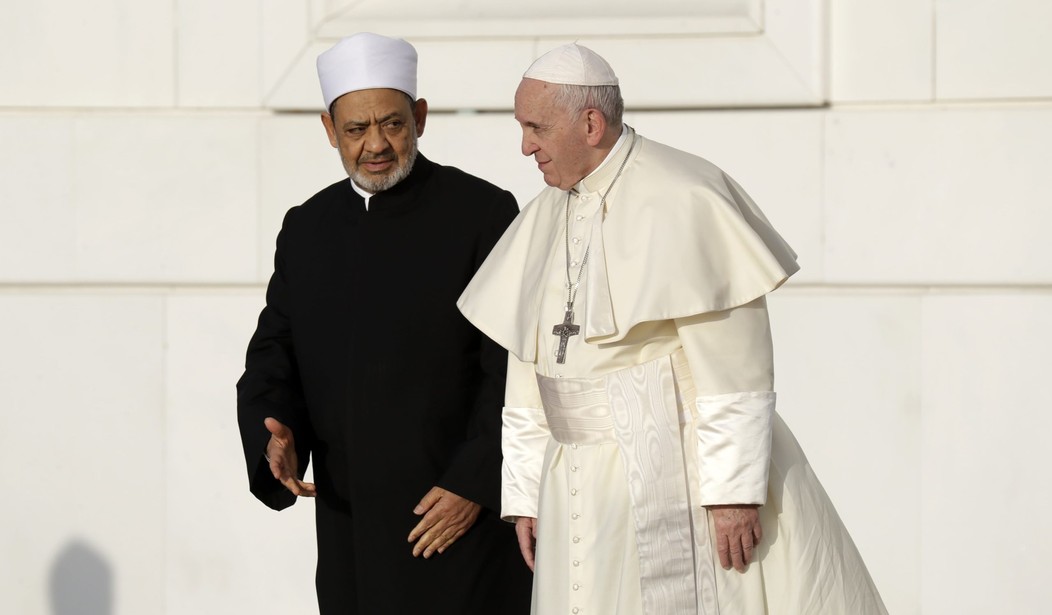Pope Francis and the Grand Imam of Al-Azhar Ahmad el-Tayeb, a Sunni Egyptian leader, signed a joint declaration in the United Arab Emirates on Monday stating that God “has no need to be defended by anyone and does not want His name to be used to terrorize people.”
The “Document on Human Fraternity for World Peace and Living Together” states that “faith leads a believer to see in the other a brother or sister to be supported and loved” and that all persons who have faith in God should “unite and work together.”
The two parties agreed on “a culture of dialogue as the path; mutual cooperation as the code of conduct; reciprocal understanding as the method and standard.”
“We… call upon ourselves, upon the leaders of the world as well as the architects of international policy and world economy, to work strenuously to spread the culture of tolerance and of living together in peace; to intervene at the earliest opportunity to stop the shedding of innocent blood and bring an end to wars, conflicts, environmental decay and the moral and cultural decline that the world is presently experiencing,” the document continues.
Religious extremism, nationalism and intolerance have essentially created a “third world war being fought piecemeal,” it adds.
Pope Francis and the imam called for “awakening religious awareness” to “confront tendencies that are individualistic, selfish, conflicting, and also address radicalism and blind extremism in all its forms and expressions.”
They condemned “all those practices that are a threat to life such as genocide, acts of terrorism, forced displacement, human trafficking, abortion and euthanasia. We likewise condemn the policies that promote these practices.”
“Religions must never incite war, hateful attitudes, hostility and extremism, nor must they incite violence or the shedding of blood. These tragic realities are the consequence of a deviation from religious teachings. They result from a political manipulation of religions and from interpretations made by religious groups,” they continued. “We thus call upon all concerned to stop using religions to incite hatred, violence, extremism and blind fanaticism, and to refrain from using the name of God to justify acts of murder, exile, terrorism and oppression.”
“…The fact that people are forced to adhere to a certain religion or culture must be rejected, as too the imposition of a cultural way of life that others do not accept.”
The leaders stressed that “the protection of places of worship – synagogues, churches and mosques – is a duty guaranteed by religions, human values, laws and international agreements. Every attempt to attack places of worship or threaten them by violent assaults, bombings or destruction, is a deviation from the teachings of religions as well as a clear violation of international law.”
“Terrorism is deplorable and threatens the security of people, be they in the East or the West… and disseminates panic, terror and pessimism, but this is not due to religion, even when terrorists instrumentalize it. It is due, rather, to an accumulation of incorrect interpretations of religious texts and to policies linked to hunger, poverty, injustice, oppression and pride. This is why it is so necessary to stop supporting terrorist movements fueled by financing, the provision of weapons and strategy, and by attempts to justify these movements even using the media. All these must be regarded as international crimes that threaten security and world peace.”
The document added that “it is therefore crucial to establish in our societies the concept of full citizenship and reject the discriminatory use of the term minorities which engenders feelings of isolation and inferiority.”
Today, Pope Francis celebrated Mass in the Zayed Sports City in Abu Dhabi. Local officials said about 180,000 people attended, including 4,000 Muslims.
“You are a choir composed of numerous nations, languages and rites; a diversity that the Holy Spirit loves and wants to harmonize ever more, in order to make a symphony,” the pope told the crowd.









Join the conversation as a VIP Member